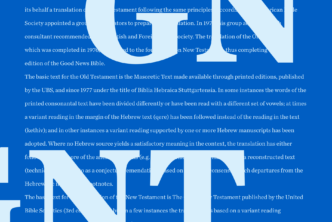Today’s Guest Blogger is Dale Pritchett, Vice President of Sales and Marketing at Logos. Also be sure to read Dale’s follow-up article Mountain Climbing: The Challenge of Learning Original Languages.
Greek and Hebrew professors are fast becoming an endangered species. Some contemporary people in “ministry” refer to Greek and Hebrew instructors as “traditionalists” when they are being kind, and “relics” when they are being critical. Language study has been labeled as elitist, impractical and unnecessary.
As VP of sales and marketing at Logos I enjoy a unique vantage point over churches, denominations and educational institutions. Because we deal with virtually every segment of Christendom, it is easy to spot common trends.
One of the easiest-to-spot trends over the past two decades has been the spiraling decline in original language requirements in seminaries and Bible schools. With two decades of momentum, this trend is now so well established it has migrated from the classroom to the pulpit. We now have pastors all over the world who lack the ability to consult or teach from original language texts common to prior generations. An unintended consequence of less rigorous study is the general lack of encouragement and emphasis on Bible study and Bible study methods courses for lay people. If a pastor does not demonstrate original language skills, there is little motivation for lay people to explore beyond the reach of their teacher.
As a result, it is now easier to find an original language Bible study methods course outside the church than inside the church.
Today we have prospective Bible college and seminary students who have grown up in churches totally devoid of original language informed teaching. These prospective students now evaluate the relevance of a seminary program on the basis of their own exposure to preaching and Bible teaching. It should come as no surprise that the most attractive seminary programs are marketed with compelling phrases like, “does not require study of the biblical languages for graduation.”
It is easy to fault the spirit of anti-intellectualism in the church today. It is easy to say there is little immediate payoff for all the hard work, and perhaps easiest of all to say, “Original language study is a lot of work for something I will never use.” Unfortunately, the preceding statement may be proven quite true in the reality of today’s church.
Original language study needs to be a reasonable amount of work for a skill you will use all your life. I believe this can be accomplished with automated tools.
I know seminaries would like to see more students take an interest in original languages but they are faced with a trend they don’t expect to see reversed any time soon. While they lament the state of Bible literacy, their first priority is student enrolment. Schools are competing for tuition dollars and they often find they must deliver the programs demanded by the market as opposed to programs designed by the institution. I believe this can be changed. This is where the cycle can be broken.
If a seminary really wants its students to work with original languages it needs to adopt methods which can make this happen. Original language study needs to become a pleasant and profitable experience for all students, not just the linguistically gifted or the doggedly determined. Let me make a couple of analogies. If you want to get a lot of people to a mountain top, you can hang a climbing rope, mark a trail, install a tram, build a road or install an elevator. Each successive technology will empower more people to get to the top. If we want everybody to get across the river we can offer swimming lessons, put a rope and pulley across the river, build a raft, operate a ferry or build a bridge. Each successive technology will empower more people to get to cross the river. If we want every student to learn to use original languages we need to build a bridge that gets everybody to the destination. This is the purpose of the Reverse Interlinear texts in Logos Bible Software.
I will say it again. Original language study needs to become a pleasant and profitable experience for all students. There needs to be a formal course of instruction to achieve this end. An English language Bible student can go a long way in Greek and Hebrew with the aid of our reverse interlinears but the benefits are best realized with first class, formal instruction in grammar and hermeneutics. If the very best Greek, Hebrew and Hermeneutics professors adopted the best computer based reverse interlinear technology, the following benefits would be realized.
- All students would be able to study original language concepts.
- Original language exegesis would take place earlier in the educational process.
- There would be a larger potential pool of students motivated to go on in original language studies.
- Language skill retention would improve dramatically because. . .
- Students would have a permanent and familiar tool for ongoing ministry.
The gifted students will still be gifted students. There will only be more of them because the original language student pool will be larger. The gifted students will move on to traditional courses and become future faculty. The average students will be functional but always dependent on the tools. But this is the key point! All students will use original languages the rest of their lives. The tide of biblical literacy will rise and the entire church will benefit.
And finally, Greek and Hebrew faculty would have secure, full, long term employment. They are the people who can generate the most value from the new tools. Powerful tools are best used by powerful teachers.




